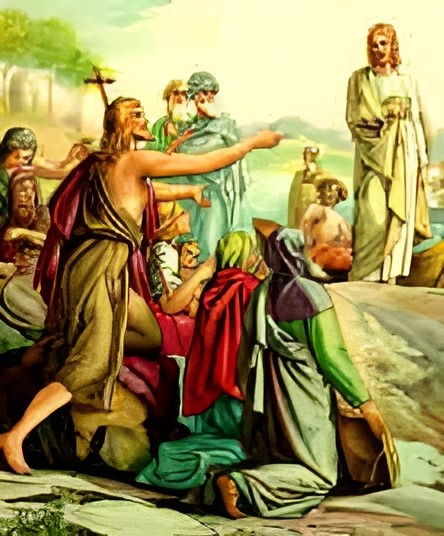Matthew 11 tells us that after he was thrown in prison, John the Baptist sent word by his disciples to Jesus to ask, “Are you the one who is to come, or shall we look for another?” By such a question we ponder that he must have felt intense discouragement and begun to second guess his entire ministry. It seems to echo of deep pain.
But it also seemed like a slap in the face to the Lord Jesus Christ, the one John had proclaimed as the Lamb of God who takes away the sins of the world.
But there was no rebuke from the Lord.
What did Jesus say about John the Baptist?
“Remind him,” the Lord said, “of what you see and hear. The blind receive their sight. The lame walk. Lepers are cleansed. The deaf hear. The dead are raised up, and . . . equally glorious with all those, the poor have the gospel preached to them.”
Yes, John. I am indeed the one who is to come. When you pointed to Me, you pointed correctly.
But after John’s disciples left to take the good news to John, Jesus turned to the crowd to talk to them specifically about John.
“What did you go out to the wilderness to see?” He asked. Everybody had been going out to see John in the wilderness. A more powerful preacher hadn’t been around in, oh, about 400 years.
“Did you go to see a reed shaken by the wind?”
Obviously not. He wouldn’t have been imprisoned if he had been weak enough to cave against Herod’s threats.
“What did you go out to see? A man dressed in soft clothing?”
I picture a chuckle running through the crowd. John had dressed in camel skins, so no.

“What did you go out to see? A prophet?”
Yes. That was it. A murmur ran through the crowd.
“Yes, and more than a prophet,” Jesus continued.
This was the messenger Isaiah talked about! “Look! I send my messenger before you, to prepare the way before you!”
John had the greatest privilege of any prophet, to actually prepare the way for the Lord Jesus Christ, Israel’s Messiah and the Savior of the world.
That is, before he landed in prison—and until his untimely death.
“No one has come who is greater than John the Baptist,” Jesus emphasized.
“And yet . . .
. . . the smallest one who is actually in the kingdom of heaven [the kingdom our Lord had been preaching about and telling parables about] is greater than John.”
Jesus said a few other mysterious things about John before He was done. But let’s imagine Jesus had said one other thing:
“John must decrease. I must increase.”
What would preachers preach about that?
I believe they would put it in context. John went to prison and died. Jesus was just getting started.
What did John the Baptist say about himself?
*****
This article has now been truncated because it has been edited and incorporated into the book . You can find that book here.
***
Go here to download your free Guide, How to Enjoy the Bible Again (when you’re ready) After Spiritual Abuse (without feeling guilty or getting triggered out of your mind). You’ll receive access to both print and audio versions of the Guide (audio read by me). I’m praying it will be helpful.

This was liberating Rebecca. Thank you so much.
I cannot believe that we’ve diminished ourselves so much in the name of piety.
Yes, that’s an excellent way to put it.
Worm Theology has done SO much damage throughout the body of Christ. It’s so very sickening, especially for abuse victims and survivors. I’ve done a series on the lies of Worm Theology at my blog, in case anyone is interested:
oasisfortheabused.wordpress.com
Similar to what one of the “Boundaries” books said about what it means to “deny yourself.” It doesn’t mean to accept mistreatment or to stop doing anything we enjoy; it means to deny our tendency to sin.
I hadn’t heard that one. “Deny yourself” will be in the next book, since it’s included in the “daily dying to self” teaching.
Well done, Rebecca!
You made it so clear. Thank you for that. I’m 52 and you are the first person I’ve ever heard say this. I needed to hear this.
Praise God, and I’m thankful it was helpful.
This is a really great way to describe the timeline of the Old Covenant to New Covenant, and how the sequence of events during that time ushered us into the age of Grace, I think it’s called?
John’s ministry was decreasing, as he passed it along to Jesus, the fulfillment.
Yes, “he must increase, I must decrease,” can lend itself easily to “make yourself small.”